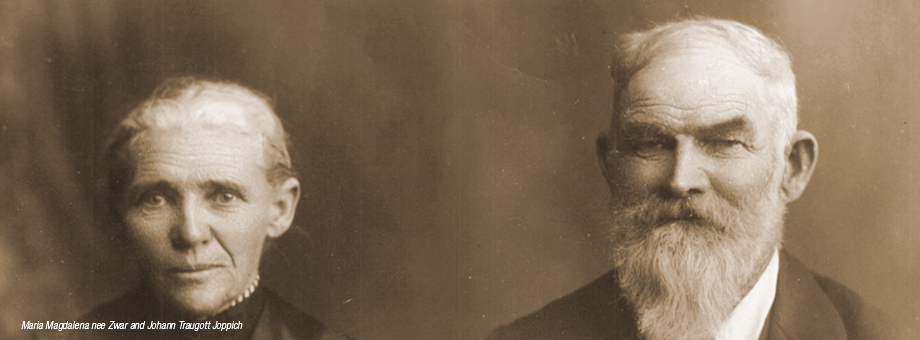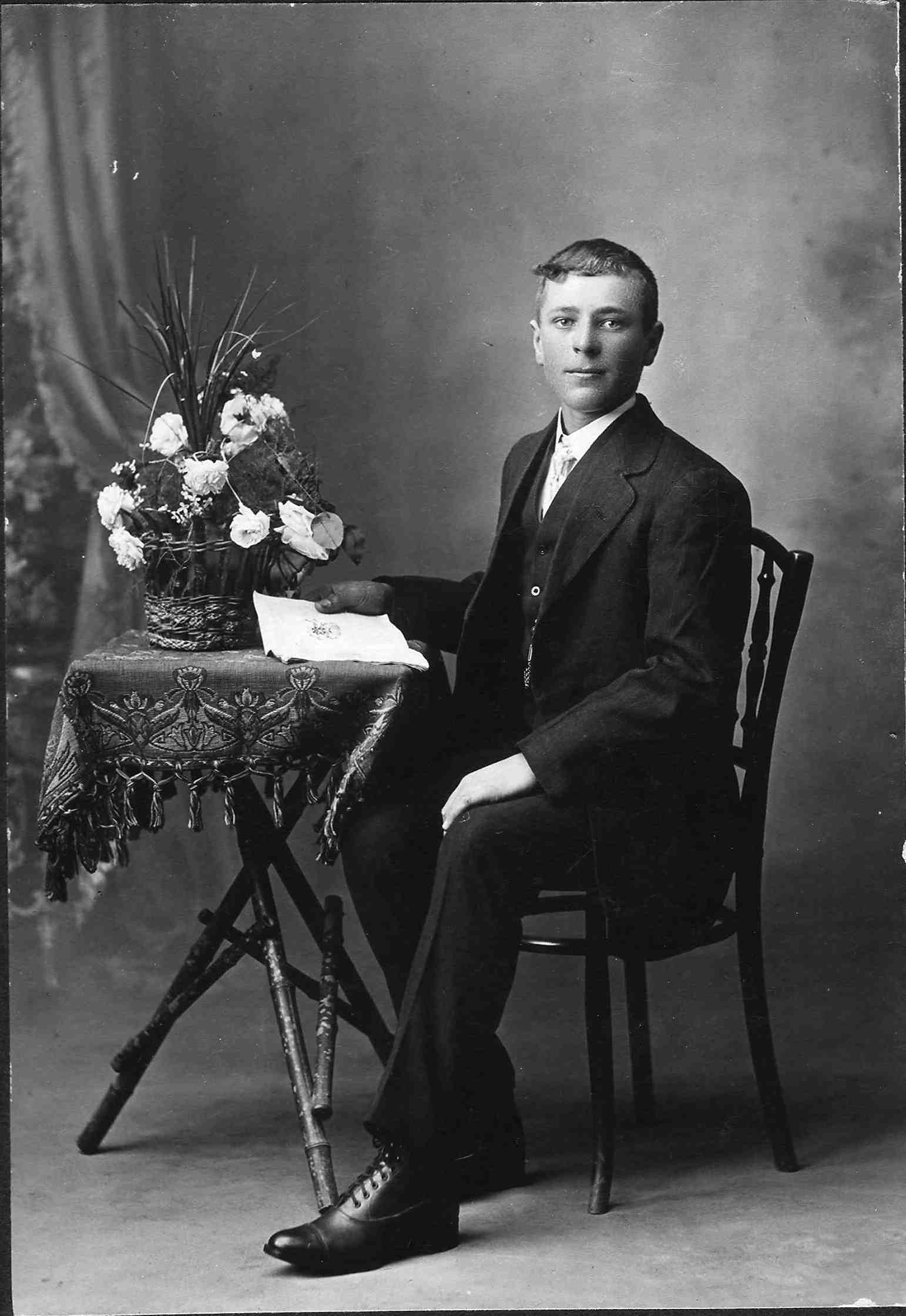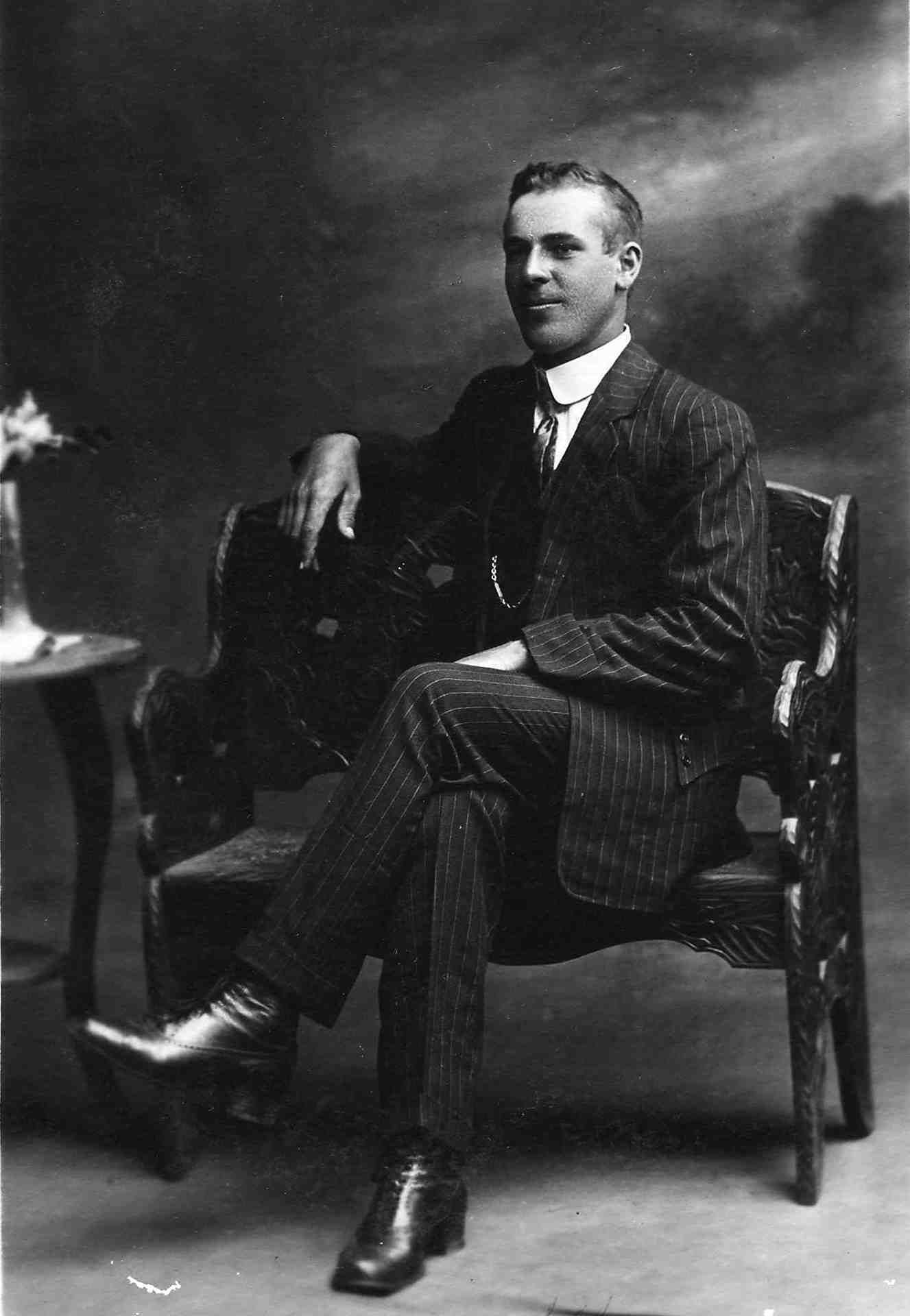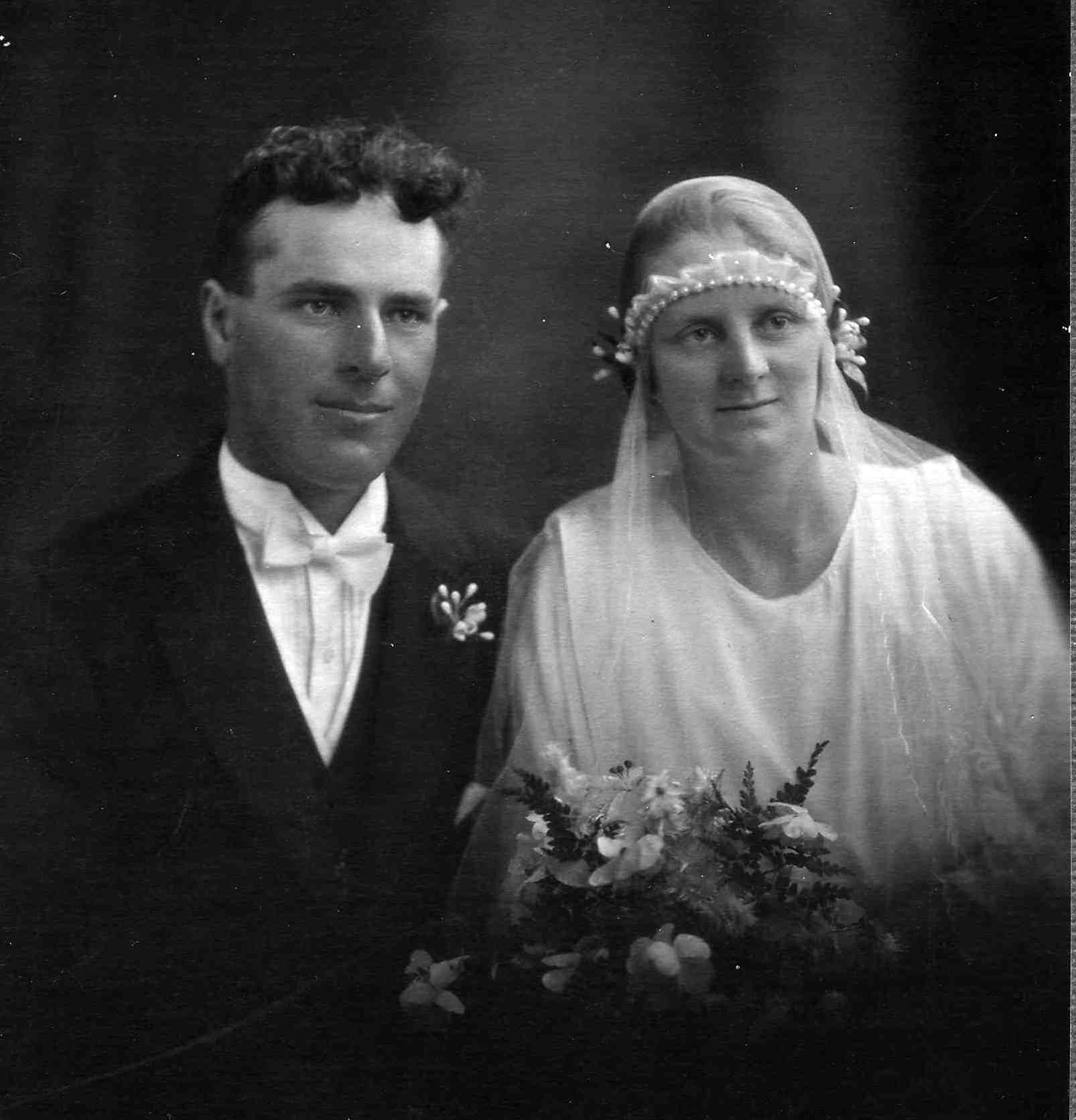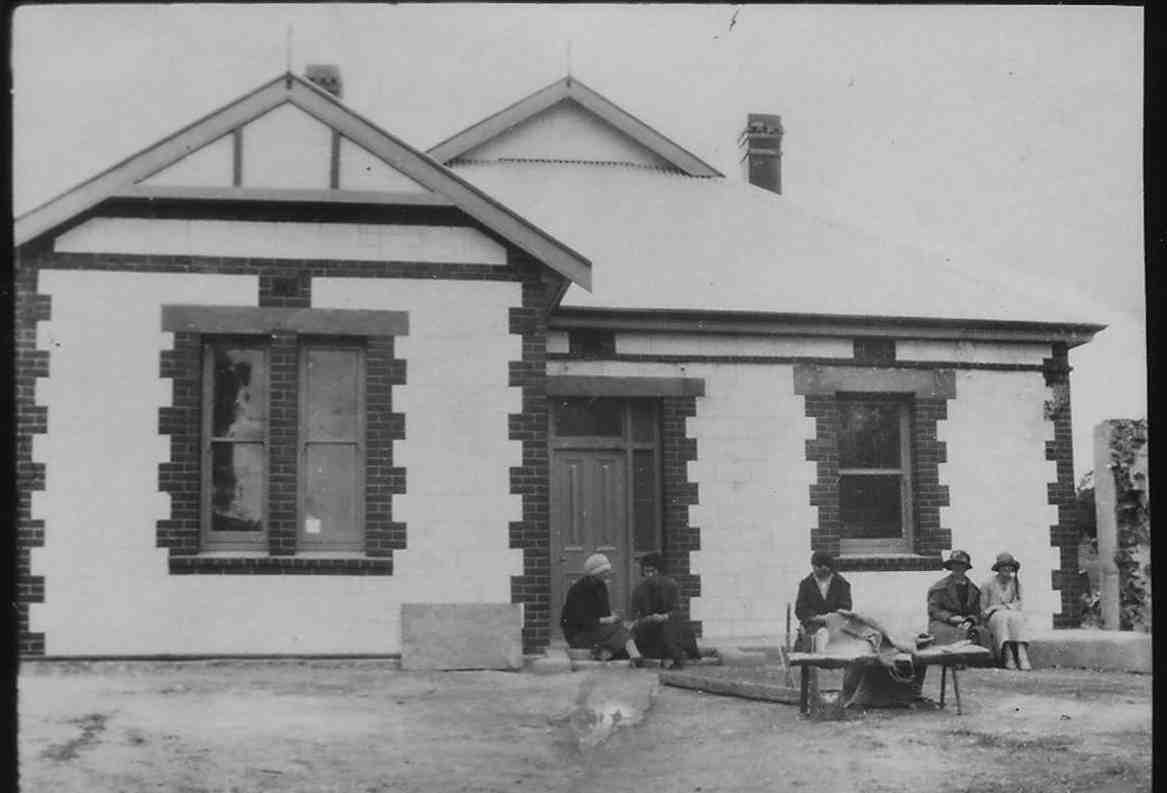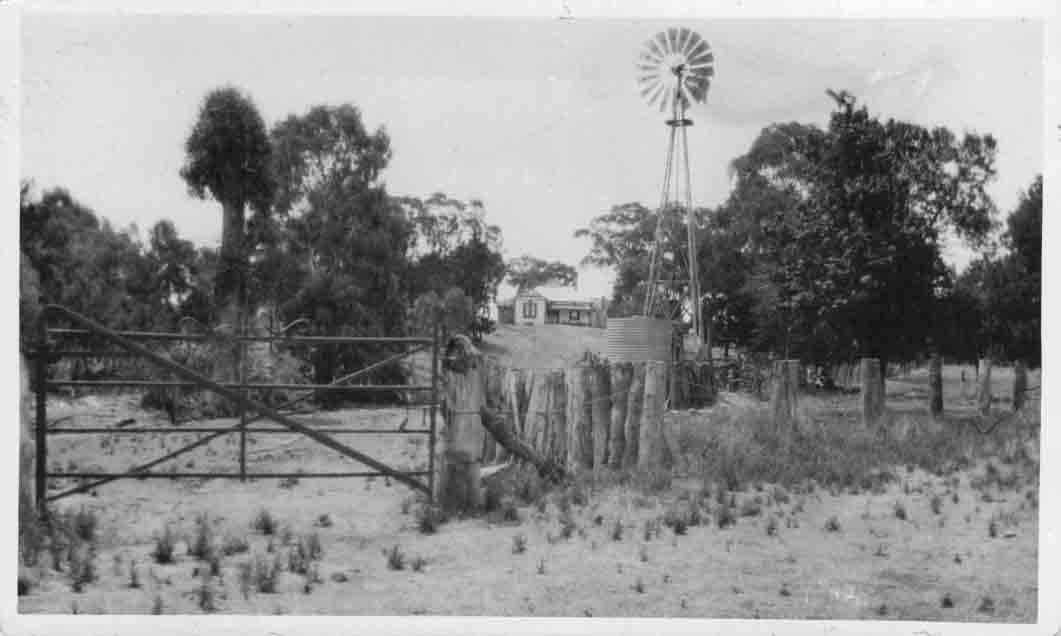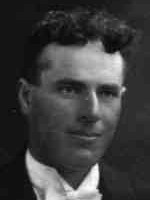
Alfred Edgar Zwar (C6.3)
- Born: 7 Dec 1898 Wirrabara family farm
- Parents:
Peter and Wilhelmine Zwar nee Wandke - Johanna Ernestine Borgas on August 20th 1924 by Rev. S. C. Rudolph
- Lived:
Wirrabara and Caltowie farms, and Tanunda in the Barossa Valley, South Australia - Died: 20 July 1979 Tanunda, South Australia
- Buried: Langmeil Cemetery, Tanunda, South Australia
- Married:
Detailed biography
Wirrabara to Caltowie
Alfred Edgar Zwar was born on the Wirrabara farm in South Australia on 7th December 1898, the third child of Peter and Wilhelmine Zwar. His grandmother Magdalene Zwar was the midwife – ‘Lena’ was midwife for all of her grandchildren, as well as many other children born in the District. He had a brother Hermann and a sister Agnes. The following year the young family moved to the Caltowie farm where Alfred grew up, and when he married he returned with his bride to the Wirrabara property where he was born.
Alfred was baptised in the Pine Creek Lutheran Church near Appila by Pastor Ortenburger on Christmas Day in 1998.
Double Tragedy
When Alfred was 14 months old a double tragedy struck the family. His mother was expecting a child and grandmother Lena had come to help look after the children and help deliver what would be another brother to Alfred. On the 8th of April, a day when Alfred’s mother Wilhelmine was not feeling well and had gone to bed to rest, little Alfred went with his brother Hermann and sister Agnes over to the straw roofed shed about 35 metres from the house where they played among bags of fertiliser. In a tragic accident bags fell on Hermann and also knocked Agnes over where she was up to her waste in the fertiliser. The bag that fell on Hermann left him covered in fertiliser and broke his neck. Their grandmother Lena had come out to check on the children and furiously dug Hermann out from under the fertiliser and discovered the tragic death of her grandson. Agnes was rescued and little Alfred escaped unscathed.
Oscar Traugott
None of the men were home at the time. The shock for Wilhelmine was so great she went into labour and Oscar Traugott Zwar was born prematurely the same day. Oscar would only live for 13 days. Alfred lost two brothers in two weeks. He would now be the oldest boy in the family. Another sister Marie and another brother Edgar arrived, making a total of four living children. Alfred and Edgar would spend a lot of time together. When they later had families of their own they wouldn’t let the children play on the stacks of wheat bags and super phosphate bags stacked in the barn.
Home
The family lived in the second house built on the property. The first was a stone hut that consisted of two rooms with a flat iron roof. [One can see this hut featured if one clicks on the Zwar ‘Family Tree’ page of this website – behind the many implements.] A single workman, Albert Nayda lived in this hut. The children loved playing games with him and he helped them with their homework.
“He looked after the horses so well he nearly slept with them.” Ed Zwar.
Ed remembered he also loved to play cards. He played the accordion and also taught Alf to play too. Alf would later play his accordion for parties and youth groups. Peter added a room on the western end of the hut that became a boy’s room. He also added the blacksmith and a buggy shed out of corrugated iron along the northern side of the old hut.
School
Agnes took her young brother Alfred to school when she was about 10 years old. They went across the paddocks to to Lange’s where they teamed up with Carl and Ted Lange and went to the Pine Creek Lutheran School via Almond Tree Corner. His first teacher was Jericho, and Agnes said that he was very strict and cruel with punishments.
Mother and Father
“Mother was always kind and good to us. She tried to help us with lessons and confirmation. When mother needed help, some of the Altmann [cousins] would come – like Tillie and Lydia.” [Sisters Agnes and Marie]. “Father worked from morning until it was dark. He was the blacksmith for the farming district. He went to clearing sales and he and Dick Becker would buy up the scrap iron to use in their workshops. Father preferred blacksmith work to the farm work. He had a certificate as a qualified wheelwright and blacksmith. Once he had 20 or more strippers lined up for him to repair the wheels. He made a set of harrows for Lange’s. He could weld the iron.” [Sisters Agnes and Marie].
Confirmation
“We had confirmation after our schooling was finished. Half a day a week, Tuesdays and Fridays generally – it depended when it suited Pastor Ortenburger.” [Marie and Edgar].
Alfred was confirmed by Pastor Ortenburger on 10th November 1912. His confirmation text was Philippians 3:17-21.
Young Alfred Zwar
Home Life
“We had jobs round the house. Agnes went to help Mrs Hermann Pech after her husband died.” “We had lots of cows to milk by hand – about 8 to 12. The horses to feed,” recalled her brother Edgar. At the same time they helped various families in the district as help was required. The girls had to help with farm work too, like pumping the bellows in the blacksmith, and helping out with the harvest. “We worked stooking sheaves of hay, loading them, and carting the wheat,” Agnes and Marie told Kevin Zwar. We visited the Daly’s sometimes – the nearest neighbours, about a mile away. Two Kennedy brothers lived in the old house near Ted Lange’s. They had bought it from Humphries, and later Herb Lange bought it. The Kennedy brothers had an old Oldsmobile car. They often came to play cards. We went to the football with them.” … Ed Zwar. “Alf bought a camera for two shillings and sixpence and I’ve still got it. When we filled the first film we took it out and washed it – and we thought we could see something! We didn’t understand films and cameras at first.” Marie Schultz nee Zwar
Church
“We went to church by buggy via the Almond Tree Corner. We never missed Church. We’d go home from Church, change the horses and go to Christenlehre [Youth Bible Study] one Sunday and to Choir the next Sunday. There was no Sunday School as the congregation ran a Lutheran Day School. The children had to read and do their sums in an examination in front of the congregation.“ Edgar Zwar “A highlight of the year was the Church Picnic, held in the early days down from the Lutheran Church near the Pine Creek crossing.” [Agnes and Marie.]
Alfred Zwar
Grandparents
“We hardly ever went to the Adelaide Hills to visit the Wandkes [their mother’s family].” Ed could recall going there once. “Grandfather Peter Zwar lifted us off the buggy by the head when we were little children. Father could understand grandfather when he spoke in Wendish but he would reply in German. He didn’t speak in Wendish himself. Father always spoke German at home. “Grandmother Zwar always baked us a birthday cake and brought the birthday cake to Church on a Sunday.” “I remember Grandfather Peter [Senior] talking about the trip out from Saxony, but I don’t remember what he said about it.” [Alfred to Kevin Zwar] Alfred: “I was sent to live with them a week or so at a time. I remember Grandfather Peter speaking in Wendish. Every night before going to bed he would sing in Wendish. He read the evening devotions at the table in German.” “Grandfather said the old homes were built of pine slabs and clay – and the young men used to look through the cracks and see the women.” Alfred to Kevin Zwar, who was amazed to hear this story from an uncle he always considered very reserved and serious!
Mother
“Mother was a good cook. We were never short of anything to eat. We had lots of fowls, sheep and pigs.” Ed Zwar. When mum needed help some of the Altmann’s, Tilly and Lydia [their cousins! K Z]] would come. A girl Jane Drage (?) learnt German from us. We did our shopping at Laura. Our mail was always to the Laura Post Office. It was a bigger place then.”
Share Farming
The two boys Alf and Ed spent a lot of time and worked together for years. Alf was five years older than Ed and he had a five furrow plough and seven or eight horses. Ed had a three furrow plough and five or six horses. Their grandfather Peter Zwar lived on the Wirrabara farm after 1904 – the year after Ed was born. When Alf was a teenager, Alf and young Ed would walk a plough and horses to Wirrabara and stay there a week or so.
The Farm
The home farm was small and some of it badly affected by salt magnesia and not suitable for cropping. A look at the farm on Google Earth shows the affected areas and probably the poorest land in the District. In my days [Kevin Zwar] the neighbouring paddock, then Lange’s, was never cropped and was overgrown with box thorns and we children had great fun hunting rabbits with our dogs. Peter Zwar had made up for the poor quality soil with his blacksmith work, and he also share farmed land. In 1914 he share farmed for Davidson, a bachelor. Then he share farmed land for Kargers, and then for Weston’s [both adjoining the Zwar farm]. Peter also share farmed for Traugott Pech for some years. The land hadn’t been cropped before and the first year they got 8 to 10 bags per acre.
Teenagers
When Alfred and Edgar were teenagers they helped build a barn – a huge one for those days.
“The barn was built with native pine timber from the farm at Wirrabara. We sawed the logs ourselves. It was built about the end of the War.” Ed Zwar.
In 1919 the silver wedding dinner for their parents was held in the barn. A photo shows numerous relatives and friends posing outside the house. The children met some relatives they had rarely seen before. The wedding breakfast for their sister Marie was held in the barn when she married Herbert Schultz.
1924
First Car
“Our first car was bought in 1924, a Buick 4, and Father [Peter] drove it, and no one else for quite a while. It was white. The leather upholstery was ‘Zwar’ leather [from the tanneries of Zwar relatives in Victoria. K Z.]. We now had to drive to Church via Staker’s corner as it used to get too wet for the car [leaving home eastwards K Z.] across the flats over to Lange’s.” Ed Zwar
Alfred and Jane Zwar
Marriage
Alfred was the first married. He married Johanna Ernstine (Jane) Borgas on the 20th August 1924 and they lived on the Zwar farm where Alfred had been born near Wirrabara 25 years earlier. “Alfred built a new stone house for himself and wife Jane before their marriage, this new building incorporated a small room of the old home, which was used as a kitchen.” [Gwen Obst nee Zwar]
Alf and Jane Zwar home
Jane Zwar nee Borgas
Jane was born Johanna Ernstine Borgas, the fifth child of Mr and Mrs C. F. H. Borgas on April 22nd 1899. Jane was baptised and confirmed in the Appila Gloria Dei Lutheran Church by Pastor A Mackenzie, and attended the Wirrabara Public School and the Appila Lutheran School.
After her marriage to Alfred Edgar Zwar the couple made their home on the farm near Wirrabara. They had a daughter Joyce, a son Reginald, and then a daughter Gwenda. After Joyce married Walter Schmidt and moved to the Barossa Valley, and Reg had married Elsie Keller, Jane and Alfred moved to Tanunda in the Barossa Valley in October 1955.
By 1955 Alfred had made repayments to his father Peter Zwar over the years of 60 pounds a year to pay off the farm.
Farming
Alfred and Jane Zwar Farm
“I had several good crops out there. It was virgin soil and it had a higher rainfall.” Alfred. “I sowed the wheat with an 18 hole drill. In a paddock of 200 acres I decided to sow in a straight line – and did. Afterwards people congratulated me for the straight drilling. We reaped with a 5 foot and then a 6 foot stripper. Later an 8 foot stripper built by Dignam at Wilmington. At first we had a hand winnower. Then a horse driven one. The horse walked on the pedals. Let the brake off and the horse would have to walk. If too slow, its heels would get caught! – soon trained. A horse would go for 20 minutes and by then sweat all over, and another horse was put in. For wheat – we got one shilling and eightpence a bushel, and it cost us two shillings to grow it.“
Shared Memories
Alfred shared with Kevin Zwar (1975) how “There used to be a snake looking out of the old house. One day I walked in there and the snake came in. We wouldn’t take notice until it ‘meant business’. I decided to kill the snake but it got away. Afterwards it still kept looking out. I took the shotgun and finished it off. I was sorry afterwards, as it was interesting to see the snake always looking out.” “I remember a spot near my place where a bullocky and his bullocks would stop for a spell. One day one bullock refused to to get up – though they tried everything. The bullocky got some straw from my paddock, lit it and put it under the bullock’s nose. The bullock soon got up!”
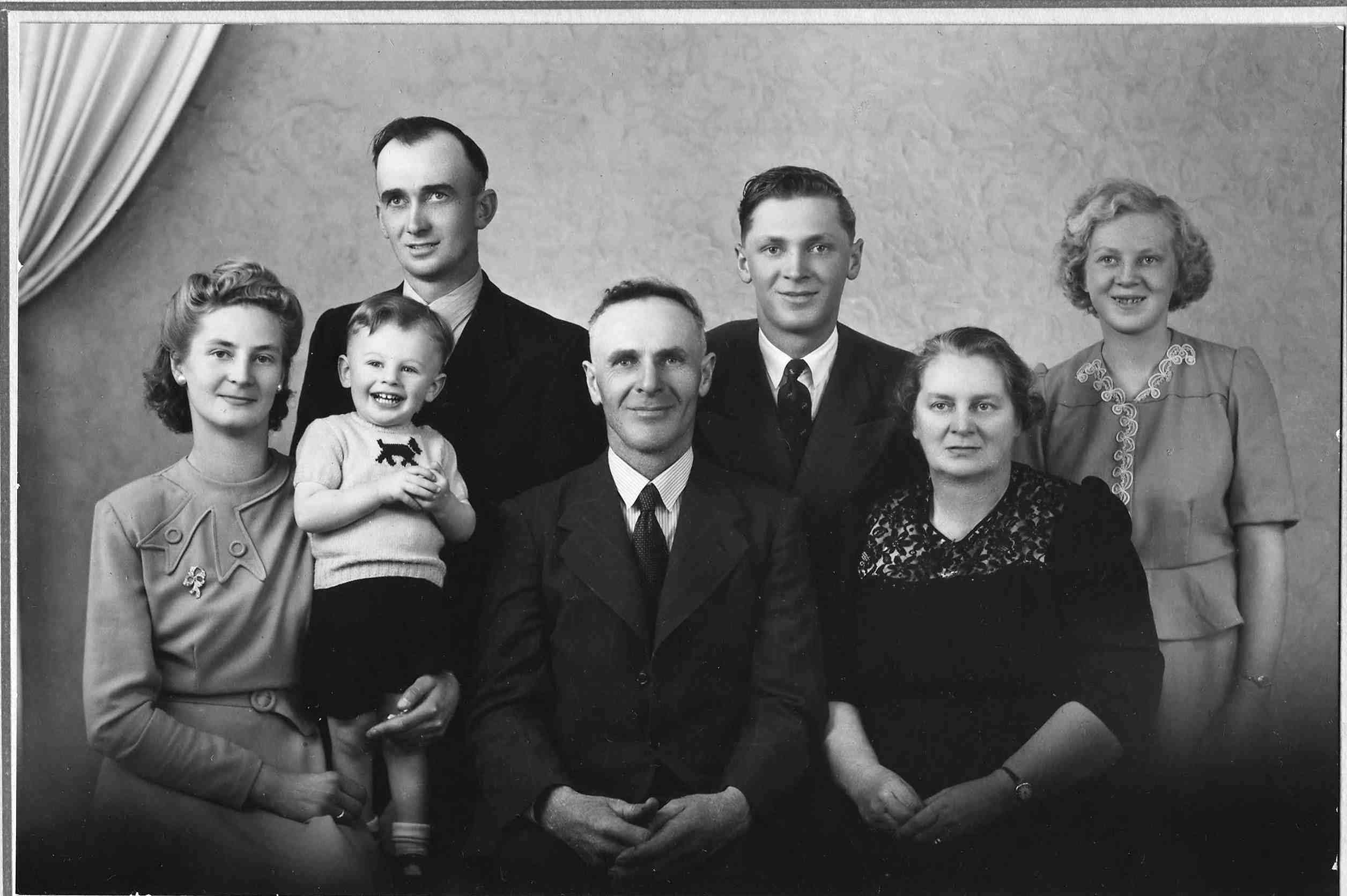
Joyce, Geoffrey and Walter Schmidt, Alfred, Reginald, Jane and Gwenda Zwar
Tanunda
Alfred took up poultry farming.
Jane was active in the community, in the Lutheran Church Ladies Guild, in the C. W. A. and Bureau work, before ill health limited her activities.
“A series of strokes finally limited Jane to a life of almost total immobility. Experience gained in handicraft work during her association with the C. W. A. now proved a real blessing as she bravely tried to occupy herself with this type of work. In this and in her endeavour to keep up with Church news, reading and in her devotional life she was an example to all of us and again proved the value of having hobbies and interests.
A patient uncomplaining sufferer who experienced the fullness of God’s promise ‘that Godliness with contentment is great gain’ she was called home at the age of 70 years and five months.” … The obituary 1.10.1969
Jane was buried in the Langmeil Lutheran Church cemetery in Tanunda on 1st October 1969.
Alfred
Alfred continued to live in their home in Tanunda for nearly 10 more years until he transferred to the Lutheran Rest Home in Tanunda in 1978. He passed away on Friday 20th July 1979 aged 80 years and 7 months. The obituary closes with the words:
“Mourning his loss are three children, two sons-in-law, one daughter-in-law, 12 grandchildren, 6 great grandchildren, one brother, Edgar and two sisters – Mrs Borgas – Wirrabara and Mrs Schultz – Laura. Pall Bearers _ David Obst, Herb Tscharke, Daryl Schmidt, Geoffrey Zwar, Donald Zwar, and Brian Zwar.”
The burial was in the Langmeil Lutheran Cemetery on 24th July 1979 by Pastor David Siegle. The text he preached on was Alfred’s confirmation text, Philippians 3.17-21, which closes with the words,
“We however, are citizens of heaven, and we eagerly wait for our saviour, the Lord Jesus Christ, to come from heaven. He will change our weak mortal bodies and make them like his own glorious body, using that power by which he is able to bring all things under his rule.” – Good News Bible.
______________________________________________________
© Compiled by Kevin P Zwar
